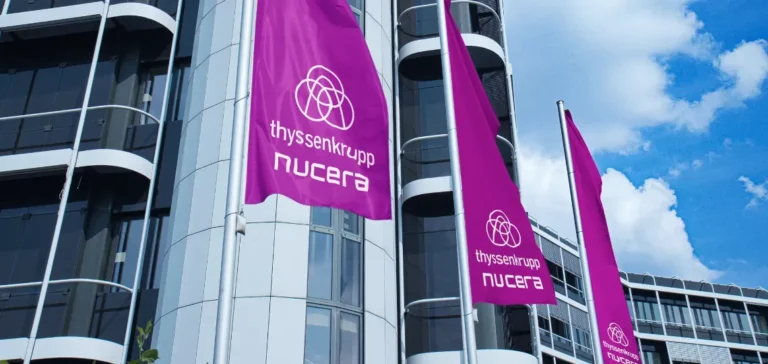thyssenkrupp nucera reported a return to profitability for the 2024/2025 fiscal year, with estimated earnings before interest and taxes (EBIT) of EUR2mn ($2.15mn), compared to a loss of EUR14mn ($15.06mn) the previous year. Preliminary, unaudited revenue reached EUR845mn ($908mn), slightly below the EUR862mn ($926mn) recorded last year. The company also maintained positive free cash flow, demonstrating its ability to finance operations internally.
Contrasting performance across segments
The Green Hydrogen (gH2) segment, using alkaline water electrolysis (AWE) technology, recorded EUR459mn ($493mn) in revenue, down from EUR524mn ($562mn) the previous year. However, EBIT loss narrowed to EUR56mn ($60mn) from EUR76mn ($81mn). The Chlor-Alkali (CA) segment showed stronger performance, with revenue increasing to EUR386mn ($414mn), compared to EUR338mn ($363mn) last year, while EBIT slightly decreased to EUR58mn ($62mn).
2025/2026 outlook under pressure
Order intake for the 2024/2025 fiscal year totalled EUR348mn ($374mn), down from EUR636mn ($683mn) the previous year. Within that, the gH2 segment accounted for just EUR26mn ($28mn), compared to EUR356mn ($382mn), while the CA segment rose to EUR322mn ($346mn) from EUR279mn ($299mn). The order backlog stood at EUR0.6bn ($645mn) as of 30 September 2025, down from EUR1.1bn ($1.18bn) a year earlier.
Strategic adjustment amid slowdown
For 2025/2026, the management board forecasts consolidated sales between EUR500mn ($538mn) and EUR600mn ($645mn), a decline from current levels. Expected EBIT ranges between EUR–30mn ($–32mn) and EUR0mn ($0mn). thyssenkrupp nucera stated it has initiated measures to offset reduced cost coverage due to lower sales, while continuing to execute its strategic goals in hydrogen and basic chemicals.
“Thanks to our position in the hydrogen and chlor-alkali markets and our financial resilience, we can overcome the current challenges,” said Dr Werner Ponikwar, Chief Executive Officer of thyssenkrupp nucera.






















